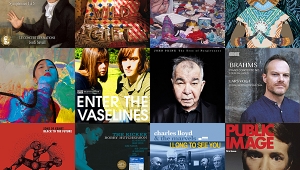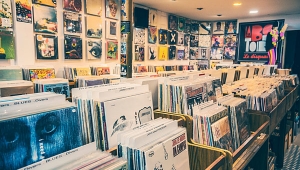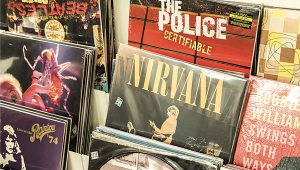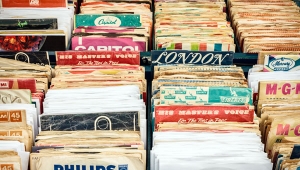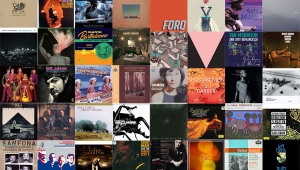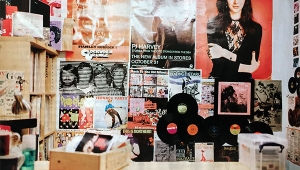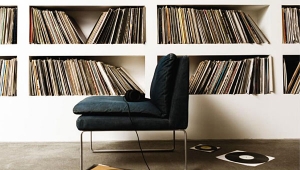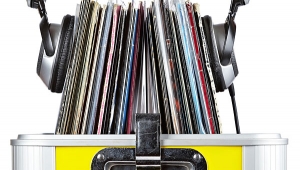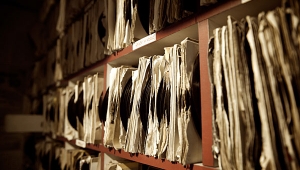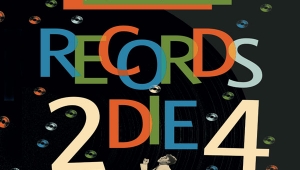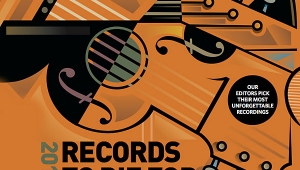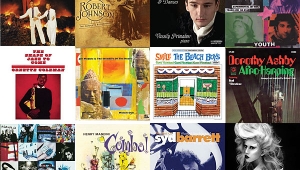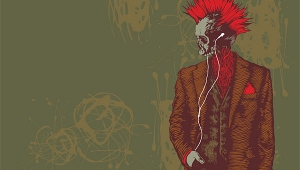| Columns Retired Columns & Blogs |
1997 Records To Die For Page 14
Michael Ullman
CHICO FREEMAN: Chico
Chico Freeman, tenor sax, flute, bass clarinet; Richard Abrams, piano; Cecil McBee, bass; Steve McCall, drums; Tito Sampa, percussion
India Navigation IN 1031 (LP/CD). 1977. AAA/ AAD.
I might have chosen Chico Freeman's late-'70s recording Spirit Sensitive, which has been reissued by Analogue Productions; or Freeman's more recent India Navigation disc, Still Sensitive. What Chico offers here is a more wide-open framework for improvisation, beginning with his long duet with bassist Cecil McBee on "Moments." Freeman's tenor sax is clear and full of body: he has presence. So does McBee's bass---this is one of McBee's greatest records, and the one that best captures his sound. Freeman's bass clarinet playing is a bonus. I'm something of a bass clarinet junkie: The complex but controlled, crying sound of the instrument seems so human. I considered The Intimate Ellington (Pablo 2310-787) for this issue merely for the astonishingly vivid sound of Harry Carney's bass clarinet on the wonderfully simple blues "Intimate Interlude." A masterpiece both as music and as a recording, "Intimate Interlude" was only one cut, though, and most of the others weren't up to the "dying-for" standard. Chico is: a wonderfully recorded small-band session of vividly played, lyrical, often free jazz, it's a winner both on LP and on the recent CD.
ELLA FITZGERALD: Sings Songs from Let No Man Write My Epitaph
Ella Fitzgerald, vocals; Paul Smith, piano
Verve V-4043 (LP). 1960. AAA.
What I mostly remember about the soddenly confusing movie Let No Man Write My Epitaph is, of course, the presence of Ella Fitzgerald. Was she there because, in the producer's mind, jazz and the drug-drenched world of the movie seemed to go together? Or was Ella included just to add a touch of class? (Remember Carmen McRae in Hotel?) Anyway, I bought the record, and Ella's intimate, supple renditions of some of the best Tin Pan Alley love songs has made it one of my favorites. The recording captures every nuance of her voice, its sudden vibrato, occasional expressive hoarseness, its warmth and essential cheerfulness. There's none of the showboating here that I find disturbing in some of her live performances. Singing "Black Coffee" at a crawling tempo, she still swings, but lightly. I'm listening to the wonderful Classic Records reissue---like the original, it presents Ella and accompanist Paul Smith so convincingly they seem right in the room. There are slight flaws---like the weird momentary resonance at the beginning of "Melancholy Baby"---but who cares? I heard Ella Fitzgerald live several times when she didn't sound this good---or this "real."

Stephen Francis Vasta
SHOSTAKOVICH: Symphony 5
Mstislav Rostropovich, National Symphony Orchestra
Teldec 94557-2 (CD only). 1996. Martin Fouqué, prod.; Eberhard Sengpiel, eng. DDD. TT: 45:27
Though Mstislav Rostropovich's previous recording of this symphony with the same orchestra (DG 2532 076, LP) preserved a distinctive, personalized interpretation, this equally insightful remake is better recorded and more confidently executed. From the eerie, vibratoless violins of the opening, through the Adagio's sustained breadth, to the incisive, tightly disciplined Finale, the conductor freshly considers every phrase with respect to balance, dynamics, and expressive intent. The music thus encompasses a broad range of emotions, but all within a straightforward, cohesive framework, never indulgently. The symphony by itself on a CD isn't the greatest buy, but if you love the music, you'll find this a worthwhile journey---one of the four or five really essential performances around.
FIBICH: Symphony 1
SMETANA: Selections from Má Vlast
Neeme Järvi, Detroit Symphony Orchestra
Chandos CHAN 9230 (CD only). 1996. Ralph Couzens, Charles Greenwell, prods.; Dan Dene, Robert Shafer, engs. DDD. TT: 60:07
Beautiful, in fact breathtaking, astonishingly gorgeous. The Bohemian Zdenek Fibich (1850-1900) shares with his better-known contemporary Dvorák a gift for melody, tossing off appealing, colorfully orchestrated tunes in almost bewildering profusion. In Symphony 1, Neeme Järvi maintains a consistent forward flow, springs the rhythms nicely, and shapes phrases with point, making it sound like one of the great masterpieces of Slavonic music. The first two installments of Smetana's patriotic cycle here sound freshly minted: Vysehrad unfolds majestically, while Vltava is simply magnificent---steadily flowing, with an unusually dancelike central section. Chandos's recording is a bit bigger than life, but the luscious sonorities are certainly seductive, and inner detail registers without obvious spotlighting. Given Järvi's proclivities for recording music in big batches, I'm looking forward to further installments of a complete Fibich cycle (and a complete Má Vlast).

J.P. Wearing
VERDI: Requiem, Quattro Pezzi Sacri
Elisabeth Schwarzkopf, soprano; Christa Ludwig, mezzo; Nicolai Gedda, tenor; Nicolai Ghiaurov, bass; Philharmonia Orchestra & Chorus, Carlo Maria Giulini
EMI CDCB 47257 2 (2 CDs only). 1964. NOT LISTED, eng. ADD. TT: 2:07:38
At my hopefully very distant wake, I'm having Giulini's version of Verdi's Requiem played. Even after 33 years, it really is that good, and remains the absolute yardstick for all other performances. Giulini is at one with Verdi's score, and provides a thoroughly idiomatic interpretation. Soloists, choir, and orchestra are magnificent, giving almost unbelievably dramatic and committed performances. Even Schwarzkopf's quirky vocalizations are endearing. The one blemish is the occasionally distorted sound. There are other fine recordings, but they simply cannot supplant Giulini's sublime and visceral account in my affections. It'll be a grand send-off.
MAHLER: Symphony 8
Heather Harper, soprano; Lucia Popp, soprano; Arleen Augér, soprano; Yvonne Minton, alto; Helen Watts, alto; René Kollo, tenor; John Shirley-Quirk, baritone; Martti Talvela, bass; Vienna State Opera Chorus, Singverein Chorus, Vienna Boys Choir, Chicago Symphony Orchestra, Georg Solti
London 414 493-2 (2 CDs only). 1972. NOT LISTED, eng. ADD. TT: 79:34
Everything about Mahler's Eighth is stunning---its composition in 10 weeks, its innovative content, and the numbers required for performance. It also needs a conductor with an architectural vision to bring its musical, philosophical, and dramatic elements together coherently. Solti is such a visionary. His dynamism is sustained through to the inspirational climax of Part Two. Solti is here blessed with eight exceptional soloists, and equally top-notch choirs and orchestra, all of which respond to his every demand. The amazing 1971 sound is as good on CD. Just crank up your gear, rattle the windows, shake up the neighbors, and create your own superlatives.

Barry Willis
STAN GETZ/JOAO GILBERTO: Getz/Gilberto
Stan Getz, tenor sax; Joao Gilberto, guitar, vocals; Antonio Carlos Jobim, piano; Tommy Williams, bass; Milton Banana, drums; Astrud Gilberto, vocals
Verve 810 048-2 (CD only). Creed Taylor, prod.; Phil Ramone, Val Valentin, engs. AAD. 1963. TT: 33:25
STAN GETZ/CHARLIE BYRD: Jazz Samba
Stan Getz, tenor sax; Charlie Byrd, guitar; Keter Betts, bass; Gene Byrd, bass, guitar; Buddy Deppenschmidt, Bill Reichenbach, drums
Verve 810 061-2 (CD only). Creed Taylor, prod.; Ed Green, eng. AAD. 1962. TT: 33:29
A two-in-one entry: conjoined twins may have different names, but the same blood circulates in their bodies. Brazilian jazz took the world by storm in the wake of the phenomenal film Black Orpheus, winner at the 1959 Cannes film festival. In the 1960s these recordings were in heavy rotation on the turntables of jazzheads on every side of the Iron Curtain, and for good reasons: "Desafinado," "Corcovado," "Samba de Una Nota Solo," "Samba Triste," "Vivo Sohando," and the immortal "Girl from Ipanema."
ELLA FITZGERALD/LOUIS ARMSTRONG: Ella and Louis
Louis Armstrong, trumpet, vocals; Ella Fitzgerald, vocals; Oscar Peterson, piano; Herb Ellis, guitar; Ray Brown, bass; Buddy Rich, drums
Verve 825 373-2 (CD only). Norman Granz, prod.; Val Valentin, eng.; Dennis Drake, digital remastering. ADD. 1956. TT: 54:20
Set the wayback machine for a more innocent time: August 16, 1956. Caught at the top of their game, Louis, Ella, and their quartet of ace musicians gently swing through 11 wonderful old standards by Irving Berlin, Hoagy Carmichael, the Gershwin brothers, and others. Some of the original tape hiss survives on the CD, but the fi is hi, warm, balmy, and enormously reassuring. The performers seem to be having a genuinely great time playing genuinely great music: Love graces every note. Can anyone sit through "A Foggy Day," "The Nearness of You," or "Cheek to Cheek" and remain unhappy?
CHICO FREEMAN: Chico
Chico Freeman, tenor sax, flute, bass clarinet; Richard Abrams, piano; Cecil McBee, bass; Steve McCall, drums; Tito Sampa, percussion
India Navigation IN 1031 (LP/CD). 1977. AAA/ AAD.
I might have chosen Chico Freeman's late-'70s recording Spirit Sensitive, which has been reissued by Analogue Productions; or Freeman's more recent India Navigation disc, Still Sensitive. What Chico offers here is a more wide-open framework for improvisation, beginning with his long duet with bassist Cecil McBee on "Moments." Freeman's tenor sax is clear and full of body: he has presence. So does McBee's bass---this is one of McBee's greatest records, and the one that best captures his sound. Freeman's bass clarinet playing is a bonus. I'm something of a bass clarinet junkie: The complex but controlled, crying sound of the instrument seems so human. I considered The Intimate Ellington (Pablo 2310-787) for this issue merely for the astonishingly vivid sound of Harry Carney's bass clarinet on the wonderfully simple blues "Intimate Interlude." A masterpiece both as music and as a recording, "Intimate Interlude" was only one cut, though, and most of the others weren't up to the "dying-for" standard. Chico is: a wonderfully recorded small-band session of vividly played, lyrical, often free jazz, it's a winner both on LP and on the recent CD.
ELLA FITZGERALD: Sings Songs from Let No Man Write My Epitaph
Ella Fitzgerald, vocals; Paul Smith, piano
Verve V-4043 (LP). 1960. AAA.
What I mostly remember about the soddenly confusing movie Let No Man Write My Epitaph is, of course, the presence of Ella Fitzgerald. Was she there because, in the producer's mind, jazz and the drug-drenched world of the movie seemed to go together? Or was Ella included just to add a touch of class? (Remember Carmen McRae in Hotel?) Anyway, I bought the record, and Ella's intimate, supple renditions of some of the best Tin Pan Alley love songs has made it one of my favorites. The recording captures every nuance of her voice, its sudden vibrato, occasional expressive hoarseness, its warmth and essential cheerfulness. There's none of the showboating here that I find disturbing in some of her live performances. Singing "Black Coffee" at a crawling tempo, she still swings, but lightly. I'm listening to the wonderful Classic Records reissue---like the original, it presents Ella and accompanist Paul Smith so convincingly they seem right in the room. There are slight flaws---like the weird momentary resonance at the beginning of "Melancholy Baby"---but who cares? I heard Ella Fitzgerald live several times when she didn't sound this good---or this "real."
Stephen Francis Vasta
SHOSTAKOVICH: Symphony 5
Mstislav Rostropovich, National Symphony Orchestra
Teldec 94557-2 (CD only). 1996. Martin Fouqué, prod.; Eberhard Sengpiel, eng. DDD. TT: 45:27
Though Mstislav Rostropovich's previous recording of this symphony with the same orchestra (DG 2532 076, LP) preserved a distinctive, personalized interpretation, this equally insightful remake is better recorded and more confidently executed. From the eerie, vibratoless violins of the opening, through the Adagio's sustained breadth, to the incisive, tightly disciplined Finale, the conductor freshly considers every phrase with respect to balance, dynamics, and expressive intent. The music thus encompasses a broad range of emotions, but all within a straightforward, cohesive framework, never indulgently. The symphony by itself on a CD isn't the greatest buy, but if you love the music, you'll find this a worthwhile journey---one of the four or five really essential performances around.
FIBICH: Symphony 1
SMETANA: Selections from Má Vlast
Neeme Järvi, Detroit Symphony Orchestra
Chandos CHAN 9230 (CD only). 1996. Ralph Couzens, Charles Greenwell, prods.; Dan Dene, Robert Shafer, engs. DDD. TT: 60:07
Beautiful, in fact breathtaking, astonishingly gorgeous. The Bohemian Zdenek Fibich (1850-1900) shares with his better-known contemporary Dvorák a gift for melody, tossing off appealing, colorfully orchestrated tunes in almost bewildering profusion. In Symphony 1, Neeme Järvi maintains a consistent forward flow, springs the rhythms nicely, and shapes phrases with point, making it sound like one of the great masterpieces of Slavonic music. The first two installments of Smetana's patriotic cycle here sound freshly minted: Vysehrad unfolds majestically, while Vltava is simply magnificent---steadily flowing, with an unusually dancelike central section. Chandos's recording is a bit bigger than life, but the luscious sonorities are certainly seductive, and inner detail registers without obvious spotlighting. Given Järvi's proclivities for recording music in big batches, I'm looking forward to further installments of a complete Fibich cycle (and a complete Má Vlast).
J.P. Wearing
VERDI: Requiem, Quattro Pezzi Sacri
Elisabeth Schwarzkopf, soprano; Christa Ludwig, mezzo; Nicolai Gedda, tenor; Nicolai Ghiaurov, bass; Philharmonia Orchestra & Chorus, Carlo Maria Giulini
EMI CDCB 47257 2 (2 CDs only). 1964. NOT LISTED, eng. ADD. TT: 2:07:38
At my hopefully very distant wake, I'm having Giulini's version of Verdi's Requiem played. Even after 33 years, it really is that good, and remains the absolute yardstick for all other performances. Giulini is at one with Verdi's score, and provides a thoroughly idiomatic interpretation. Soloists, choir, and orchestra are magnificent, giving almost unbelievably dramatic and committed performances. Even Schwarzkopf's quirky vocalizations are endearing. The one blemish is the occasionally distorted sound. There are other fine recordings, but they simply cannot supplant Giulini's sublime and visceral account in my affections. It'll be a grand send-off.
MAHLER: Symphony 8
Heather Harper, soprano; Lucia Popp, soprano; Arleen Augér, soprano; Yvonne Minton, alto; Helen Watts, alto; René Kollo, tenor; John Shirley-Quirk, baritone; Martti Talvela, bass; Vienna State Opera Chorus, Singverein Chorus, Vienna Boys Choir, Chicago Symphony Orchestra, Georg Solti
London 414 493-2 (2 CDs only). 1972. NOT LISTED, eng. ADD. TT: 79:34
Everything about Mahler's Eighth is stunning---its composition in 10 weeks, its innovative content, and the numbers required for performance. It also needs a conductor with an architectural vision to bring its musical, philosophical, and dramatic elements together coherently. Solti is such a visionary. His dynamism is sustained through to the inspirational climax of Part Two. Solti is here blessed with eight exceptional soloists, and equally top-notch choirs and orchestra, all of which respond to his every demand. The amazing 1971 sound is as good on CD. Just crank up your gear, rattle the windows, shake up the neighbors, and create your own superlatives.
Barry Willis
STAN GETZ/JOAO GILBERTO: Getz/Gilberto
Stan Getz, tenor sax; Joao Gilberto, guitar, vocals; Antonio Carlos Jobim, piano; Tommy Williams, bass; Milton Banana, drums; Astrud Gilberto, vocals
Verve 810 048-2 (CD only). Creed Taylor, prod.; Phil Ramone, Val Valentin, engs. AAD. 1963. TT: 33:25
STAN GETZ/CHARLIE BYRD: Jazz Samba
Stan Getz, tenor sax; Charlie Byrd, guitar; Keter Betts, bass; Gene Byrd, bass, guitar; Buddy Deppenschmidt, Bill Reichenbach, drums
Verve 810 061-2 (CD only). Creed Taylor, prod.; Ed Green, eng. AAD. 1962. TT: 33:29
A two-in-one entry: conjoined twins may have different names, but the same blood circulates in their bodies. Brazilian jazz took the world by storm in the wake of the phenomenal film Black Orpheus, winner at the 1959 Cannes film festival. In the 1960s these recordings were in heavy rotation on the turntables of jazzheads on every side of the Iron Curtain, and for good reasons: "Desafinado," "Corcovado," "Samba de Una Nota Solo," "Samba Triste," "Vivo Sohando," and the immortal "Girl from Ipanema."
Jazz Samba was recorded in audio verite by Ed Green at All Souls Unitarian Church in Washington, DC in February 1962. Getz/Gilberto is a studio recording from the following year by Phil Ramone, who wisely abandoned his "wall of sound" technique for a warm, intimate acoustic. R2D4 fans: You read this feature to build a respectable music library. These recordings are must-haves! Free of irony and self-conscious posturing, this is the theme music of a period that was in many ways far hipper than anything since. Japanese purist-audiophile LP pressings were available in the mid-'80s; an LP of Jazz Samba is available on DCC Compact Classics LPZ-2011. Play through tubes for greater authenticity. (Getz/Gilberto, XVII-12, XVIII-2, 3; Jazz Samba, XVIII-3, XIX-3)
ELLA FITZGERALD/LOUIS ARMSTRONG: Ella and Louis
Louis Armstrong, trumpet, vocals; Ella Fitzgerald, vocals; Oscar Peterson, piano; Herb Ellis, guitar; Ray Brown, bass; Buddy Rich, drums
Verve 825 373-2 (CD only). Norman Granz, prod.; Val Valentin, eng.; Dennis Drake, digital remastering. ADD. 1956. TT: 54:20
Set the wayback machine for a more innocent time: August 16, 1956. Caught at the top of their game, Louis, Ella, and their quartet of ace musicians gently swing through 11 wonderful old standards by Irving Berlin, Hoagy Carmichael, the Gershwin brothers, and others. Some of the original tape hiss survives on the CD, but the fi is hi, warm, balmy, and enormously reassuring. The performers seem to be having a genuinely great time playing genuinely great music: Love graces every note. Can anyone sit through "A Foggy Day," "The Nearness of You," or "Cheek to Cheek" and remain unhappy?
- Log in or register to post comments

